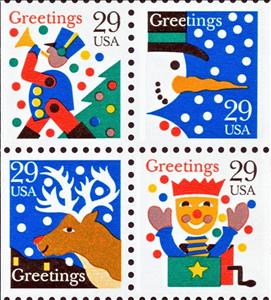Se-tenant: Christmas 1993 (United States of America 1993)
Christmas 1993 (United States of America 1993)
21 October (United States of America ) within release Christmas 1993 goes into circulation Se-tenant Christmas 1993 face value 4*29 United States cent
| Se-tenant Christmas 1993 in catalogues | |
|---|---|
| Michel: | Mi: US 2410-2413 |
| Stamp Number: | Sn: US 2798c |
Se-tenant is square format.
Block of 4Also in the issue Christmas 1993:
- Stamp - Snowman face value 29;
- Stamp - Red-Nosed Reindeer face value 29;
- Stamp - Madonna and Child in and Landscape by Giovanni Battista Cima face value 29;
- Se-tenant - Christmas 1993 face value 4*29;
- Stamp - Snowman face value 29;
- Se-tenant - Madonna and Child in a Landscape, by Giovanni Battista Cima face value 2*29;
- Booklet Pane - Madonna and Child in a Landscape, by Giovanni Battista Cima face value 4*29;
- Stamp - Greetings: Jack-in-the-Box face value 29;
- Stamp - Madonna and Child in a Landscape, by Giovanni Battista Cima face value 29;
Se-tenant Christmas 1993 it reflects the thematic directions:
Christmas or Christmas Day (Old English: Crīstesmæsse, meaning "Christ's Mass") is an annual festival commemorating the birth of Jesus Christ, observed most commonly on December 25 as a religious and cultural celebration among billions of people around the world. A feast central to the Christian liturgical year, it is prepared for by the season of Advent or the Nativity Fast and initiates the season of Christmastide, which historically in the West lasts twelve days and culminates on Twelfth Night; in some traditions, Christmastide includes an Octave. The traditional Christmas narrative, the Nativity of Jesus, delineated in the New Testament says that Jesus was born in Bethlehem, in accordance with messianic prophecies; when Joseph and Mary arrived in the city, the inn had no room and so they were offered a stable where the Christ Child was soon born, with angels proclaiming this news to shepherds who then disseminated the message furthermore. Christmas Day is a public holiday in many of the world's nations, is celebrated religiously by the vast majority of Christians, as well as culturally by a number of non-Christian people, and is an integral part of the holiday season, while some Christian groups reject the celebration. In several countries, celebrating Christmas Eve on December 24 has the main focus rather than December 25, with gift-giving and sharing a traditional meal with the family.
A toy or plaything is an object that is used primarily to provide entertainment. Simple examples include toy blocks, board games, and dolls. Toys are often designed for use by children, although many are designed specifically for adults and pets. Toys can provide utilitarian benefits, including physical exercise, cultural awareness, or academic education. Additionally, utilitarian objects, especially those which are no longer needed for their original purpose, can be used as toys. Examples include children building a fort with empty cereal boxes and tissue paper spools, or a toddler playing with a broken TV remote control. The term "toy" can also be used to refer to utilitarian objects purchased for enjoyment rather than need, or for expensive necessities for which a large fraction of the cost represents its ability to provide enjoyment to the owner, such as luxury cars, high-end motorcycles, gaming computers, and flagship smartphones.


